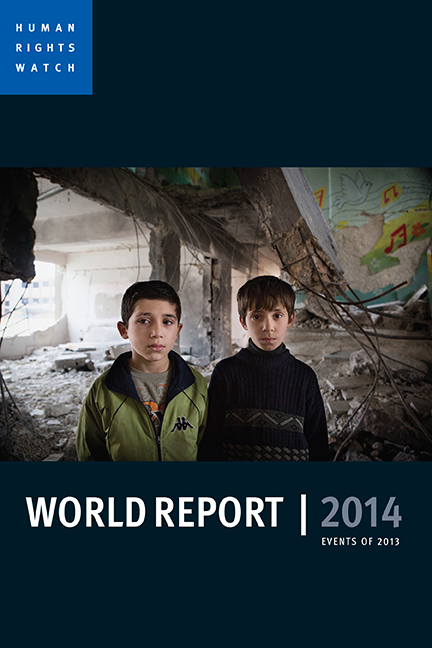Book contents
- Frontmatter
- Dedication
- HUMAN RIGHTS WATCH
- Table of Contents
- Foreword
- Rights Struggles of 2013: Stopping Mass Atrocities, Majority Bullying, and Abusive Counterterrorism
- The Human Rights Case for Drug Reform How Drug Criminalization Destroys Lives, Feeds Abuses, and Subverts the Rule of Law
- Putting Development to Rights: Integrating Rights into a Post-2015 Agenda
- The Right Whose Time Has Come (Again) Privacy in the Age of Surveillance
- Photo Essays
- AFRICA
- AMERICAS
- ASIA
- EUROPE AND CENTRAL ASIA
- MIDDLE EAST AND NORTH AFRICA
- UNITED STATES AND CANADA
- 2013 HUMAN RIGHTS WATCH PUBLICATIONS
- Acknowledgments
- Frontmatter
- Dedication
- HUMAN RIGHTS WATCH
- Table of Contents
- Foreword
- Rights Struggles of 2013: Stopping Mass Atrocities, Majority Bullying, and Abusive Counterterrorism
- The Human Rights Case for Drug Reform How Drug Criminalization Destroys Lives, Feeds Abuses, and Subverts the Rule of Law
- Putting Development to Rights: Integrating Rights into a Post-2015 Agenda
- The Right Whose Time Has Come (Again) Privacy in the Age of Surveillance
- Photo Essays
- AFRICA
- AMERICAS
- ASIA
- EUROPE AND CENTRAL ASIA
- MIDDLE EAST AND NORTH AFRICA
- UNITED STATES AND CANADA
- 2013 HUMAN RIGHTS WATCH PUBLICATIONS
- Acknowledgments
Summary
Horrific abuses in the north by the militant Islamist group Boko Haram and the Nigerian security forces’ heavy-handed response to this violence dominated Nigeria's human rights landscape in 2013. In May, President Goodluck Jonathan imposed a state of emergency, which was extended for another three months in November in the three states where Boko Haram is most active. The emergency failed to curb atrocities and to sufficiently protect civilians. The prosecutor of the International Criminal Court said that there was reason to believe Boko Haram had committed crimes against humanity.
More than 400 people died in 2013 from violent inter-communal conflict in Nigeria's Middle Belt states, and scores were rendered homeless from the clashes. Security forces throughout the country engaged in human rights abuses. There were few investigations or prosecutions of these crimes.
The judiciary remained nominally free from interference and pressures from other branches of government, but corruption did impede pursuit of justice. Poverty and corruption continued to afflict the oil-rich Niger Delta, while the weakness of anti-corruption institutions in government inhibited the realization of social and economic rights and the fair and transparent functioning of the public and private sectors.
Boko Haram Violence
The four-year insurgency by Boko Haram, which seeks to impose a harsh form of Sharia, or Islamic law, in northern Nigeria and end government corruption, has killed more than 5,000 people. Although the Nigerian government set up a committee to develop an amnesty framework for Boko Haram, the group continued to target government security agents, churches, and mosques.
Since 2012, Boko Haram has burned more than 300 schools in the north and deprived more than 10,000 children of an education. In a particularly gory attack in July, suspected armed Islamists killed 42 pupils and teachers and burned down a government-owned boarding school in Mamudo village, Yobe state.
The Nigerian government's support for the formation of armed self-defense groups, mostly young men to assist in the apprehension of Islamist insurgents, brought a new and alarming dimension to its anti-Boko Haram efforts. These young men themselves became targets of Boko Haram attacks. In one August incident in Borno state, Boko Haram killed 24 members of the “Civilian Joint Task Force,” as the group is called. Thirty other members were declared missing.
- Type
- Chapter
- Information
- World Report 2014Events of 2013, pp. 148 - 153Publisher: Bristol University PressPrint publication year: 2014



